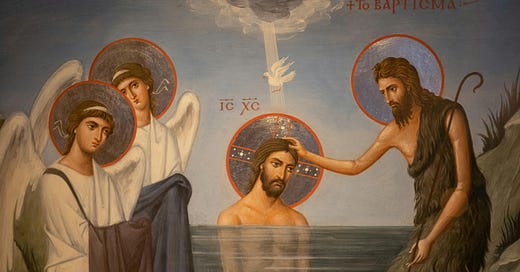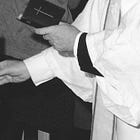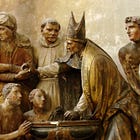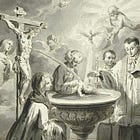Faith, hope and charity – theological virtues and baptism explained
What happens in your soul when you are baptised?

In a valid and fruitful baptism, a soul is washed from the stain of original sin, made a Christian, a child of God and a member of the Church.
It elevates a person from the natural order to the supernatural order.
This means that the person is a new creature, with a new principle of life – Christ’s. The person is a new, supernatural organism and is fitted to worship God through the theological virtues of faith, hope and charity, which are infused at that moment.
But what is meant by these theological virtues? Trust, optimism and kindness?
No.
Much of the following applies not to a merely valid baptism, but to a fruitful one, within the bosom and unity of the Catholic Church, and in which no impediments prevent the sacrament having its effect.
We will see more about that below.
Faith
Faith is the supernatural gift which enables us to believe, without doubting, whatever God has revealed. We believe whatever God has revealed because God is truth itself, and can neither deceive nor be deceived. We know what we are to believe because of the testimony, teaching and authority of the Roman Catholic Church, which is the true Church of Christ in this world.
Faith is not just an opinion: nor is it a feeling. The Oath Against Modernism reads:
“I hold with certainty and sincerely confess that Faith is not a blind sentiment of religion welling up from the depths of the subconscious under the impulse of the heart and the motion of a will trained to morality.”
On the contrary:
“[F]aith is a genuine assent of the intellect to truth received by hearing from an external source. By this assent, because of the authority of the supremely truthful God, we believe to be true that which has been revealed and attested to by a personal God, our creator and lord.”
St Paul teaches that we cannot please God without faith. We are obliged to give a firm and irrevocable assent to all the teachings of the Church – and the rejection of even one revealed dogma is such as to destroy the virtue of faith within us.
This assent may be implicit in many cases. This is why the Act of Faith – which we should all pray regularly – reads: “… I believe these, and all the truths which the Catholic Church teaches, because, etc.”
However, there are at least two principal truths – that God exists and that he judges and rewards those who seek him – which must be believed explicitly in this way: not as opinions, but because God has revealed this to us, and because the Church has proposed them to us.
The common opinion amongst theologians is that, if an adult wishes to be saved and to please God, then he must also believe explicitly in the Holy Trinity and the incarnation of Christ and his redemption.
Here is a simple summary of the Apostles’ Creed, which contains the basic and most essential truths of divine revelation:
All this – the reason for our faith, and the reason for the certainty of our faith, is summed up in the amazing text taken from 1 John, which is read on Low Sunday (the Easter Octave) in the traditional Roman rite:
Whatsoever is born of God overcometh the world: and this is the victory, which overcometh the world, our faith.
Who is he that overcometh the world, but he that believeth that Jesus is the Son of God? This is He that came by water and blood, Jesus Christ: not by water only, but by water and blood.
And it is the Spirit which testifieth that Christ is the truth.
And there are three who give testimony in heaven: the Father, the Word and the Holy Ghost: and these three are one. And there are three that give testimony on earth: the Spirit and the water and the blood; and these three are one.
If we receive the testimony of men, the testimony of God is greater: for this is the testimony of God, which is greater, because He hath testified of His Son. He that believeth in the Son of God hath the testimony of God in himself. (1 John 5.4-10)
St Paul teaches that “faith comes through hearing.” Even if we are not priests or bishops, we have a duty to serve as living echoes of the Church, and share her teaching in season and out of it.
There are many men who will not have the chance to “hear” a priest or bishop – but they may have the chance to hear us. Hearing us may well be the means by which certain souls are led to faith, to being able to please God, and ultimately to Heaven.
It can be dangerous for new converts to find or put themselves into the position of teachers or religious influencers without spending a sufficient amount of time acclimatising themselves to their new religion. This is especially so for the more complex and controversial questions which face us today.
Nonetheless, one’s conversion may give one’s neighbour his first proper chance to hear about the Gospel. We should try to make good use of what we have been given, for God's greater glory, and in the bosom and unity of the Catholic Church.
Hope
Hope is the supernatural gift by which we firmly trust that God will give us eternal life, as well as the means which are necessary to obtain it (his supernatural grace), provided we do what he requires of us.
This hope is certain because God is infinitely good, infinitely powerful, and is faithful to his promises.
Here is an image to make this issue clear. If we get on a plane to Texas, we expect eventually to arrive. In fact, the plane may crash, or be diverted, or any other eventuality may occur. Further, we ourselves may jump off of the plane.
With regards to hope, the point is this: so long as we do what God requires of us, we can be absolutely sure that our plane will arrive at the destination of Heaven. There will be no crashes or diversions. The only possible way that we will not arrive in Heaven is if we ourselves jump off, through mortal sin.
But we do not live this supernatural life alone – we live it with God’s grace. This grace is freely given to us by God, for the sake of our sanctification and salvation. He gives everyone the grace which is sufficient to be saved, and he opens it to us through the means of prayer and the sacraments.
Neglect of either prayer or the sacraments will surely lead us, ultimately, to falling into mortal sin – and thus off “the plane.”
There are many great spurs for the virtue of hope in the Holy Scripture. Here are some verses from Isaias to that effect:
Fear not, for I am with thee: turn not aside, for I am thy God: I have strengthened thee, and have helped thee, and the right hand of my just one hath upheld thee.
Behold all that fight against thee shall be confounded and ashamed, they shall be as nothing, and the men shall perish that strive against thee.
Thou shalt seek them, and shalt not find the men that resist thee: they shall be as nothing: and as a thing consumed the men that war against thee.
For I am the Lord thy God, who take thee by the hand, and say to thee: Fear not, I have helped thee.
This is why we have hope – because God is infinitely good, powerful, and faithful.
But what are we to make of such warlike words as these? How do they intersect with the final theological virtue?
Charity
Charity is the supernatural gift by which we love God as he loves himself, and above all other things. It entails repentance from sin, and is impossible without the virtue of faith.
It is a new kind of love: we now are able to love others as ourselves not because we want to do so, but for God’s sake. We love them because they are creatures made by the Holy Trinity, made in the image and likeness of God, and for whom Christ shed his precious blood.
If our neighbour is already a member of the Church, then we love him as a member of our own body – which is Christ’s. We are more one with him than we are with anyone who is unbaptised or outside the Church. He shares the same spiritual mark on his soul as we do, marking him as part of the flock of Christ.
Baptism has the effect of making us members of the Church – unless we place an impediment to it, through public acts of heresy, schism, or apostasy. But even then, the heretic, schismatic and apostate retain the mark – they are, as St Robert Bellarmine said, like sheep who have wandered away from the flock:
“[T]he character does not make a heretical man to be actually in the Church, but it is only a sign that he was in the Church, and that he should be in the Church. Therefore a brand burned on a sheep, when it wanders away in the mountains, does not place it in the flock, but it indicates from which flock he ran away, and where he can be forced to return.”
While such men are certainly outside the Church and separated from us, we are nonetheless still able to love them for God’s sake, and for the sake of the character on their souls – and by our prayers, perhaps we can assist them in returning to this flock.
Even if our neighbour is not baptised, he remains a man for whom Christ shed his blood: a potential member of the Church, a potential brother in the supernatural order – and an actual brother in the natural order. How can we not love him?
It is notorious that elements amongst the people of the Old Covenant understood the commandment to “Love thy neighbour” as pertaining solely to the fellow members of their nation.
It is true that we owe a special love and duty towards those of our own household and circle, and indeed to the Church – the spiritual nation of the New Covenant.
Nonetheless, we know, from the teaching and example of Christ, that this commandment extends to the whole of the human race, including our enemies. We are to love these men for God’s sake – and to love them into the Church, where they may be saved.
There are many men who attack Catholics, perceiving us to be their enemy. Christ shed his blood for these men too. These attacks give us the opportunity to exercise the theological virtue of charity.
Not that we should stop standing up for truth. But we could remember St Paul’s words:
If it be possible, as much as is in you, have peace with all men.
Revenge not yourselves, my dearly beloved; but give place unto wrath, for it is written: Revenge is mine, I will repay, saith the Lord.
But if the enemy be hungry, give him to eat; if he thirst, give him to drink. For, doing this, thou shalt heap coals of fire upon his head.
Be not overcome by evil: but overcome evil by good.
Conclusion – Why did God make you?
The English Penny Catechism opens with these two questions:
Who made you? – God made me.
Why did God make you? – God made me to know him, love him and serve him in this life, and to be happy with him forever in the next.
The life of the theological virtues – that is, the life of worshiping God with faith, hope and charity – is what will allow us to fulfil the second question of the Penny Catechism, and to arrive at the happy conclusion.
God has made us to be happy. We may or may not be happy in this life, but happiness – indeed, supernatural happiness beyond our imagination – is the end for which our loving God has made us and redeemed us.
We should try and fix that in our minds, and share it with anyone we can. We should also memorise such questions and answers – especially this one – and repeat them frequently. They may be an anchor by which God wants to hold us to himself when times are difficult, or when our minds have all but deteriorated in old age.
From time to time, we see high profile conversions – and there will always be those who look for reasons to say that such conversions insincere. For our part, we offer such men our congratulations for entering upon the life of a baptised Catholic.
To this end, let us pray “that he who hath begun a good work… will perfect it unto the day of Christ Jesus.” (Philippians 1.6)
HELP KEEP THE WM REVIEW ONLINE!
As we expand The WM Review we would like to keep providing free articles for everyone. If you have benefitted from our content please do consider supporting us financially.
A subscription from you helps ensure that we can keep writing and sharing free material for all.
Plus, you will get access to our exclusive members-only material!
Thank you!
Further Reading






